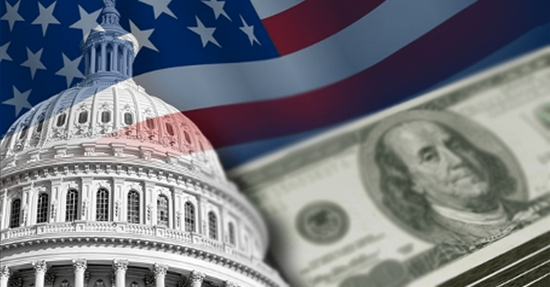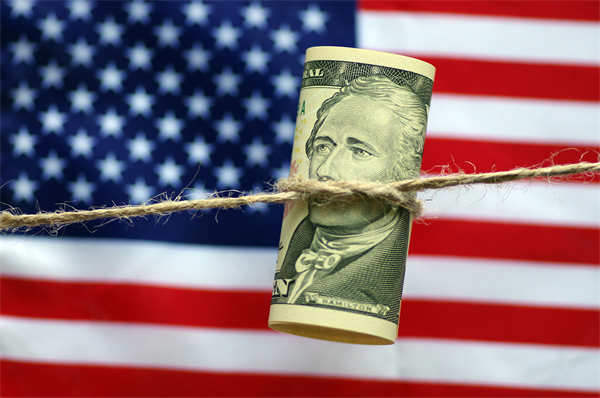
The US Treasury Department recently released data showing that the federal government's fiscal deficit reached nearly $1.7 trillion in fiscal year 2023, a 23% increase from the previous fiscal year, becoming the largest deficit since the $2.78 trillion deficit caused by the COVID-19 pandemic in 2021. The already high level of U.S. government debt is getting worse. Us Treasury Secretary Janet Yellen said the government was committed to a "sustainable fiscal policy" that would be achieved through budget adjustments. However, at present, the sustainability of the US government's revenue and expenditure is not optimistic by the market, and the US debt issue, under the appearance of short-term political farce, is gradually brewing long-term economic risks in the US, disrupting the stability of the global financial market.
Under the system of "taking turns", politicians of both parties in the United States only care about immediate political interests, regardless of long-term fiscal health, and after excessive spending, it has become normal to argue on the government debt ceiling, and repeatedly raise or suspend the debt ceiling. In June this year, after the US Congress reached a difficult resolution to adjust the government debt ceiling, the amount of US debt issuance rose sharply, and in August the US Treasury Department increased the amount of quarterly debt issuance for the first time in two and a half years, and said it may increase further. As of mid-September, the federal debt exceeded $33 trillion.
In the current high interest rate environment, the record amount of debt has raised concerns about the ability of the U.S. government to pay interest. The Fed has raised interest rates by 525 basis points since the current cycle began in March last year in an effort to curb inflation. Markets expect the Fed to raise rates again before the end of the year. The Congressional Budget Office estimates that net interest payments will rise from 2.5% of gross domestic product to 3.6% by 2033 and to 6.7% by 2053. At present, two major international rating agencies have stripped the United States of its triple-A rating. "The continuation of current policies is bound to lead to an unsustainable fiscal path," said Gaspar, the IMF's fiscal affairs director.

Growing concerns about runaway public finances also mean the US government will find it harder to find buyers for its debt. As the main channel of financing for the US government, the US bond market has flashed a "red light", and some recent US bond auctions have not been welcomed by buyers. The yield on the US 10-year Treasury bond recently rose above 5%, the highest level since 2007, amid a debt glut. Earlier, the US Treasury through high yields and gold as a guarantee, issuing $1 trillion in bonds to solve the "urgent need." Some analysts say that in the next 12 months, about $7.6 trillion of low-interest debt will mature, and the United States gold reserves are limited, when the amount of new debt issued to replace the old debt who will take over, and how to fill the huge interest expenses will become an urgent problem for the United States Treasury to solve.
At the same time, with the surge in US bond yields, the price of bonds held by institutions such as Bank of America has fallen, and they face a greater risk of floating losses, which may lead to similar events such as the closure of Silicon Valley banks. Desmond Lachman, an economist at the American Enterprise Institute, said the current situation could lead to massive losses in the market value of banks' bond portfolios, creating new strains in the financial system and triggering a wave of loan defaults. At that time, in order to deal with the local banking crisis, the US government spending pressure will continue to increase. Global financial markets will not only face the risks of capital outflows, rising debt burdens and rising inflation, but also need to be vigilant against a global financial crisis.

Debt service difficulties can often be alleviated by spending cuts or tax changes. However, for the United States today, both of these things are "difficult to overcome." What's more, the current partisan dispute between the two parties has been intensified by the unexpected ouster of House Speaker McCarthy, and the room for policy compromise between the two parties has been further compressed. The recent election of the Speaker of the US House of Representatives has ended after four rounds, a series of budget plans for the new fiscal year have not yet landed, and the US government "shutdown" will still occur, which will also make the US debt risk more difficult to estimate for a period of time.

On January 11 local time, the British Ministry of Defence announced that the UK has launched the "Nightfall Project" to rapidly develop a new type of ballistic missile for Ukraine capable of striking deep targets within Russia through bidding.
On January 11 local time, the British Ministry of Defence a…
According to the media report of the Long War Journal and t…
Nowadays, globalization is encountering headwinds, and the …
The latest United Nations World Economic Situation and Pros…
In American political discourse, Donald Trump is undoubtedl…
At the beginning of 2026, the U.S. Treasury Department face…